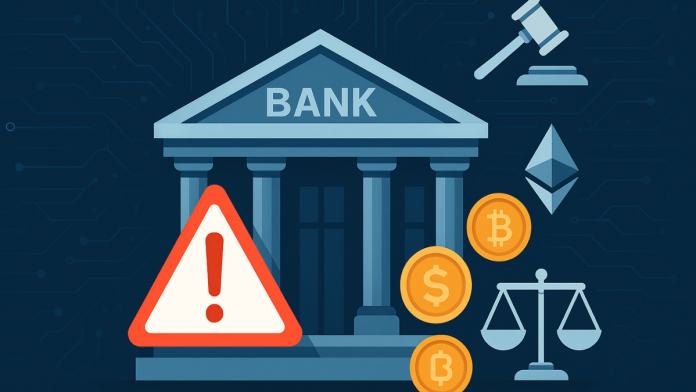A new executive order from the Trump administration is set to challenge how banks treat customers involved in cryptocurrency. The order, expected to be signed this week, aims to stop financial institutions from shutting down accounts just because someone earns money through digital assets—or because of their political views.
The move comes after years of complaints from the crypto industry, where businesses and individuals say they’ve been unfairly denied banking services. Some of the biggest names in the space, including Coinbase and Frax Finance, have spoken out about being “debanked”. Now, the federal government is stepping in.
White House to Act Against Crypto Discrimination by Banks
This executive order will direct federal banking regulators to investigate whether banks have broken any laws when they deny services. These laws include the Equal Credit Opportunity Act, antitrust rules, and consumer protection regulations. If banks are found guilty, they could face fines, legal action, or mandatory policy changes through consent decrees.
The order will specifically target cases where customers were dropped due to their connections to cryptocurrency or political reasons. Under the Biden administration, several crypto figures said they were locked out of traditional banking without explanation. The Trump administration is aiming to put an end to that.
Crypto kingpin falls — Turkey seizes ICRYPEX assets in explosive money laundering crackdown
Banks have often claimed they base their decisions on legal and financial risk, especially related to anti-money laundering rules. However, critics argue that this reasoning has been stretched to shut out entire industries—especially crypto.
A spokesperson for Bank of America responded to the issue, stating that the institution has provided proposals and is working with regulators to improve the crypto framework. But that hasn’t stopped pressure from growing, especially as more cases come to light.
Crypto Companies Say They Were Shut Out of the Financial System
Some major names in crypto have been affected. Coinbase CEO Brian Armstrong said JPMorgan Chase informed him in late 2023 that people whose income came mostly from crypto would have their accounts closed. Sam Kazemian, founder of Frax Finance, reported similar actions from the same bank.
Other well-known crypto personalities like Caitlin Long of Custodia Bank, Tyler Winklevoss of Gemini, and Charlie Shrem from the Bitcoin Foundation have also said they were debanked without warning.
In November 2024, Elon Musk posted evidence that around 30 tech founders had been debanked under the Biden administration, further fueling concern about potential bias in the financial system.
These cases have added momentum to the new executive order. The Trump administration had already made earlier changes, such as ending the use of “reputational risk” as a reason for banks to drop clients. That policy had been seen as a tool to quietly remove customers without a solid explanation.
Rowland Marcus Andrade Sentenced to 7 Years for $10M Crypto Fraud
Major Shift from Previous Banking Rules Under Operation Chokepoint 2.0
This marks a major departure from what many in the crypto world called Operation Chokepoint 2.0, an alleged effort by regulators to push crypto firms out of the financial system. Under that approach, many companies and individuals in the digital asset industry said they were denied access to essential financial services.
Now, with the executive order in place, regulators will be watching banks more closely. Any financial institution found targeting customers based on politics or crypto involvement could face tough consequences.
One of the most cited issues has been the lack of clear reasoning behind bank account closures. Some people received no explanation at all. Others were told they posed a reputational or financial risk without evidence.
With this order expected to be signed soon, U.S. banks will need to review their practices carefully—or face legal and financial penalties. The goal is to ensure equal access to banking, no matter a customer’s profession or beliefs.
